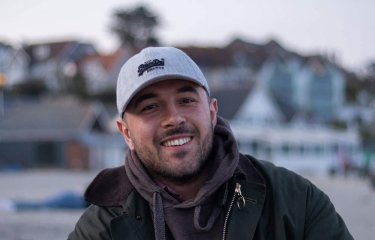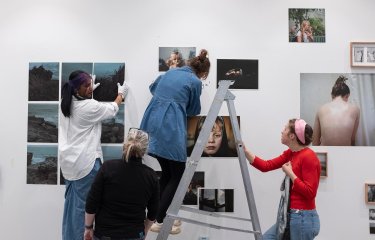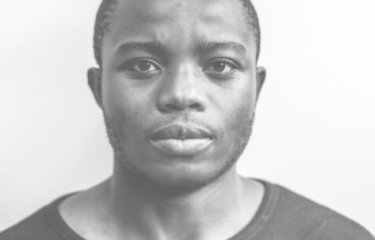MA graduate’s photo series sheds light on Australia’s frontier wars
11 February 2025

Bluff Rock, Ngoorabul Nation, 2024. Work by Glenn Porter
Photography MA (Online) graduate, Glenn Porter, has achieved remarkable success with his Final Major Project, ‘Out of the Shadows’ which was recently published in the ‘Crime, Media, Culture’ international journal.
While a criminology journal may seem like an unusual home for a photography project, Glenn’s work—exploring Australia’s colonial past and the often-overlooked violence of the frontier wars—proves how powerful imagery can challenge historical narratives and contribute to broader academic discourse. In this article, Glenn shares insights into his work, the inspiration behind it, and his experience studying on our online Photography MA.
Could you tell us what your Final Major Project, ‘Out of the Shadows’ is about?
‘Out of the Shadows’ is a photo series that explores concepts of place, and in particular challenges the Australian collective consequences around colonisations and the notion that the transfer of land with the indigenous people was a peaceful one. This period, known as the frontier wars by historians, was actually quite a violent time in Australian history, with the internment of indigenous families into missions, guerrilla warfare resistance from the aboriginal warriors, and large-scale massacres of indigenous mobs by the British military, police and stockmen right up until 1930.
This body of work captures the places where these violent events took place. Using a large format lensless (pinhole) camera, the sites were researched using various methods and taken using large format film. The project continues today and covers a wide geographical area.
I saw the online Photography MA as a chance to reconnect to my original goals and restart my creative practice in a meaningful way.
What was the inspiration behind this project?
I was inspired through my research and realisation of the somewhat false narrative that the settlement of Australia was a peaceful transition with the indigenous people who have occupied the continent for approximately 60,000 years. This was the narrative I grew up with as a child, and one that gave early colonists a heroic status. I want my work to highlight the historical truth and raise awareness in further truth-telling processes within a reconciliation process.
Your project was recently published as a photo essay in the ‘Crime, Media, Culture’ journal. Can you tell us how this opportunity came about?
The article was submitted through standard journal processes and included a blind peer review before being accepted. ‘Crime, Media, Culture' is a leading journal that focuses mostly on critical criminology, but what I found very exciting about the journal – which is ranked as Q1, meaning it is in the top quartile for criminology – is that it also has a photo-essay submission category in addition to the regular types of submissions, like research articles. As a photographer and researcher, this is an exciting development. In fact, photo-essay submissions are a research method that’s gaining popularity within the humanities like criminology and sociology. Photo-essays will hopefully become a mainstream journal category, widening opportunities for creative photographers to collaborate with social scientists.
Why did you decided to study Photography MA (Online) with Falmouth and what was your experience like on the course?
I have studied and practiced photography for several decades both professionally and as an educator. My earlier studies focused primarily on the applied science of photography, which was interesting, but did not fully align with my desire to produce photographs of artistic merit. Over the years, family and career commitments meant I had little time to engage in my own photography practice. I saw the online Photography MA as a chance to reconnect to my original goals and restart my creative practice in a meaningful way. The course offered a disciplined approached to reestablishing my creative practice while learning new perspectives within photography.
This Photography MA course did exactly what I hoped for. I reconnected with my creative practice; I learnt new and exciting aspects of photography and I produced a body of work which has so far led to two solo exhibitions and a photo essay published in a prestigious journal.
I thoroughly enjoyed the course and found the content exciting, new and engaging. Its well-structured format made it manageable even for those with busy schedules, and the one-to-one tuition from my tutor was invaluable. Despite living in Australia - as far away from Falmouth as one can be - the flexible course delivery allowed me to easily engage with the content. The most rewarding aspect, however, was the creative freedom it provided. Under the fabulous guidance on my tutor, I broke out of the perfectionism of imaging science and experimented with new concepts and philosophies that challenged the status quo. I loved this course and have recommended it to my friends and colleagues in photography.
External links
Explore more of Glenn's work on his website










